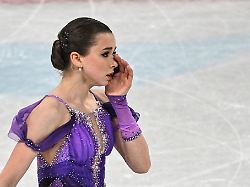Serious allegations against Russia
WADA demands lengthy sentence for child prodigy Valiyeva
02/22/2023, 1:20 p.m
The World Anti-Doping Agency is bringing the case of Russian figure skater Kamila Valiyeva to the International Court of Arbitration for Sport and demanding a four-year ban. The anti-doping agency in Russia waived a penalty for the 16-year-old in mid-January.
The World Anti-Doping Agency WADA is taking action against a decision from Russia in the doping case of Russian figure skater Kamila Valiyeva and is continuing to demand a four-year ban. Last month, 16-year-old Valiyeva, who had been hailed as a child prodigy, was acquitted of a culpable doping offense by the Russian anti-doping agency RUSADA. WADA sees this as “wrong” and has now appealed to the International Court of Arbitration for Sport CAS.
In addition to a four-year ban, WADA is also demanding that Valiyeva withdraw all results since December 25, 2021. On that day, she had tested positive for the banned substance trimetazidine at the Russian championships. The deletion of the results would also affect the Russian team that won gold in Beijing. The USA would then be the winners ahead of Japan and Canada. The only sanction RUSADA recognized so far was the result of the national title fights. At the time of the test, Valiyeva was only 15 years old and was therefore under special protection under the anti-doping rules.
The world association is also putting pressure on
The International Skating Union (Isu) also wants to appeal the decision from Russia. “The ISU believes that all young athletes must be protected from doping. Such protection cannot be provided by excluding young athletes from sanctions,” it said in a statement. In contrast to the Wada, the Isu demands that the Court of Arbitration for Sport should “impose a suspension at its own discretion” and finally decide on the results of the team competition at the 2022 Olympics. The USA and Japan finished second and third behind Russia.
The case became known at the Winter Olympics in Beijing in February 2022 after the then 15-year-old Valiyeva won Olympic gold with the team. A temporary ban had been lifted, so she was also allowed to compete in the women’s singles and finished fourth as the top favourite.
The World Anti-Doping Agency brought the case before the CAS last November, accusing RUSADA of an unreasonable delay in processing. RUSADA initially justified this by saying that the then 15-year-old runner had to be considered a “protected person”. In the arbitration proceedings subsequently initiated by the CAS, WADA had already demanded a four-year ban for Valiyeva. The International Olympic Committee (IOC) has welcomed Wada’s decision to appeal to the Cas. This is one step closer to a “final solution that the athletes are so desperately waiting for”. Only when the case is closed can the IOC decide on the award of the medal.
